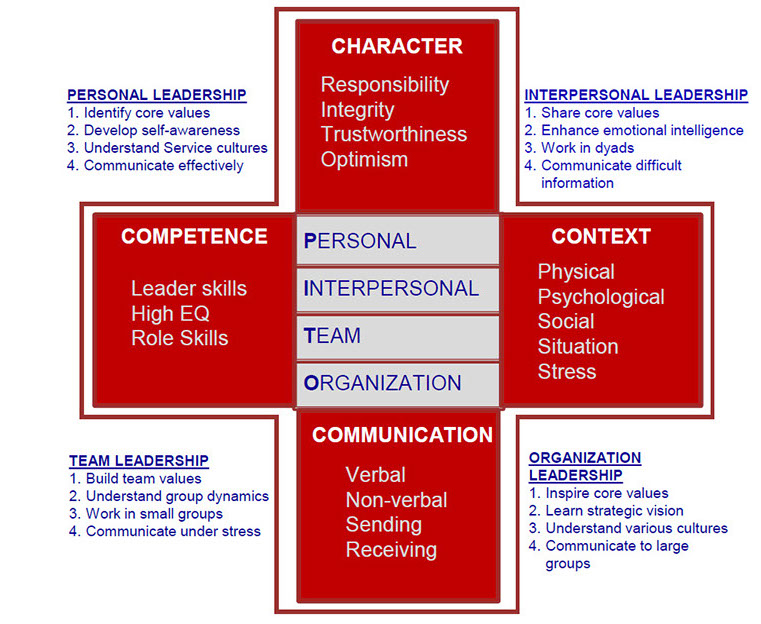ABOUT THE LEAD PROGRAM
The USU Leader and Leadership Education and Development (LEAD) Program teaches and develops knowledge, skills, and attitudes to help students become effective uniformed healthcare leaders. LEAD sessions include classroom, small group, medical field practica, clinical relevance, and self-reflections. The philosophy of USU LEAD is that Leader and Leadership Education and Development: (1) can be taught; (2) is a necessary aspect of undergraduate medical education; (3) is central and vital for all medical students; (4) must be aligned with a conceptual framework for curriculum and assessment; and (5) must be a life-cycle approach.
LEAD FACULTY
Erin S. Barry, MS
Neil E. Grunberg, PhD
Hannah G. Kleber, BA
John E. McManigle, MD
Eric B. Schoomaker, MD, PhD
LEAD CONCEPTUAL FRAMEWORK
The conceptual framework used by USU LEAD applies to leaders, managers, and followers. It includes four “C” elements (FourCe).
- Character (“Who” the leader is) refers to physical and psychological aspects of the individual (e.g., physical characteristics, appearance, demographics, attributes, personality, attitudes, beliefs, values).
- Competence (“What” the leader knows and does) refers to role-specific knowledge and skills and to general leadership knowledge and skills (e.g., critical thinking, decision-making, problem solving, motivating others, conflict resolution, emotional intelligence).
- Context (“When” and “Where” leadership occurs) includes physical (e.g., time of day; climates; nutritional state, sleep, physical well-being), psychological (e.g., behavioral health), social (e.g., size and relationships within a group), and cultural (e.g., cultural values, practices, attitudes, beliefs) environments.
- Communication (“How” leaders interact with others) includes sending and receiving information, verbally (oral and written) and nonverbally (e.g., body language and facial expressions).
Al four of the above occur across four psychosocial levels interaction - Personal, Interpersonal, Team, and Organizational (PITO).
- Personal refers to psychological and biological aspects of the individual.
- Interpersonal refers to dyadic relationships and interactions.
- Team refers to a small group committed to common goals.
- Organizational refers to large groups, institutions, and systems.
“I have participated in many leadership workshops throughout my military career, but this was by far the most educational, engaging, and enjoyable! The summit taught me new educational leadership techniques and expanded on ones that I was already aware of. I thoroughly enjoyed the interactive dialogue that occurred between all the participants.”
UNIQUE LEADERSHIP CURRICULUM
The leadership curriculum is woven and integrated throughout all four years of undergraduate medical education starting on the first day. It focuses on professional identity formation, development of relevant knowledge and skills, and learning through experience. Specific topics include: leadership types; personality and leadership; emotional intelligence; effective communication; self-assessment and peer support; crisis communication; leaders, managers, and followers; team building; performance under stress; effective leadership in context; organizational systems and leadership. Each session is based on at least one element of the conceptual framework. Various pedagogical styles and venues are used, including interactive plenary sessions, flipped classrooms, small group exercises, group discussions, applied clinical and field settings. “Near peers” (more senior medical students) and core faculty facilitate small group discussions about leadership in health care settings. This curriculum forms a foundation for leader and leadership education and development post medical school.
MILITARY MEDICAL LEADERSHIP ASSESSMENT
Military medical leadership is assessed throughout the four years of the SOM curriculum. Self-, peer-, and faculty assessments of students are designed to help students develop as leaders. Assessments of knowledge and skills relevant to leader performance are based on quizzes; self-reflections; formative and summative feedback in applied settings. All students participate in several medical field exercises during the four years where they are evaluated by faculty in applied settings. Students are provided with information about their leader performance. This information includes leader performance within each cohort of medical students, as well as leader performance across several years of USU medical student cohorts.

